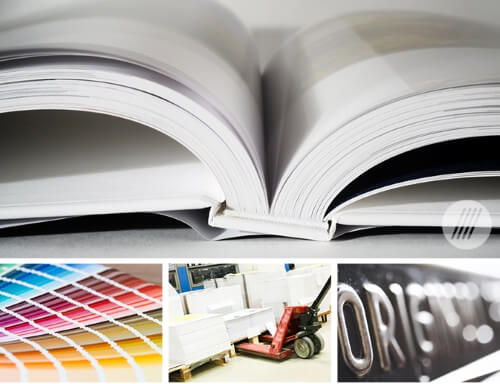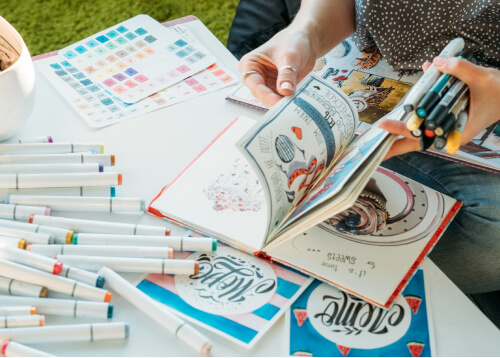Creative Features That Add Value to Your art book
Creative Features That Add Value to Your art book
Blog Article
Recognizing the Refine Behind High-grade Art Book Printing for Art Enthusiasts
When it pertains to top quality art book printing, recognizing the complexities of the process can boost your recognition for the last product. You could not recognize how necessary paper selection and ink choices are to the vibrancy of art work. Each element plays a significant function in attaining the wanted effect. As you discover the various components of art book printing, you'll reveal insights that might transform your perspective on art preservation and presentation.
The Significance of Paper Option in Art Book Printing
When it comes to art book printing, the option of paper can make or break the last product. You want your artwork to beam, and the right paper enhances color vibrancy and information. Consider factors like weight, appearance, and surface; these elements considerably affect how visitors view your job.
For example, a much heavier supply shares top quality and durability, while a textured finish can include deepness to photos. Smooth paper is excellent for detailed reproductions, allowing great lines and subtle tones to show up crisp.
Don't neglect concerning the paper's illumination; a brighter sheet can assist shades pop, making your art much more eye-catching. You'll also intend to think of just how the paper connects with inks and whether it can manage the printing procedure without warping or bleed-through. Inevitably, choosing the ideal paper sets the stage for your art, guaranteeing it captures the target market's focus equally as you pictured.
Choosing the Right Inks for Lively Recreations
Picking the ideal inks is equally as essential as choosing quality paper to achieve dynamic recreations in your art book. When you're printing art work, you want shades that pop and accurately represent the initial piece. Choose inks with a high pigment focus; these have a tendency to create richer and more saturated shades.
You could take into consideration utilizing archival inks, which resist fading over time, guaranteeing your art book stays as striking as the day it was printed. If you're dealing with pictures or digitally developed art, pigment-based inks can offer a wider color gamut, enhancing detail and deepness.
Don't neglect about the finish! Matte and shiny inks can significantly modify the look of your artwork, so assume about the look you're aiming to accomplish - art book. Ultimately, the ideal ink selection complements your paper option, creating a magnificent visual experience for your visitors
The Duty of Shade Monitoring in Print Quality
Shade monitoring plays a necessary duty in attaining high print quality for your art book. It assures that the shades you see on your screen equate precisely to the published page. Without reliable shade monitoring, your vibrant artworks might appear boring or altered, threatening your creative vision.
Next off, use shade profiles tailored for your printer and paper kind. These accounts direct the printer in reproducing shades precisely, decreasing discrepancies in between electronic and printed versions.
When you prepare your data, think about making use of a shade area like Adobe RGB or CMYK, depending on your printer's requirements. Always evidence your job, also; an examination print can disclose any type of potential color concerns prior to the last run. By prioritizing color management, you secure the stability of your art, ensuring your target market experiences it as you intended.

Comprehending Various Binding Strategies
Accomplishing the best search for your art book exceeds shade monitoring; binding strategies also play a substantial duty in its general presentation and sturdiness. You have numerous choices to assess, each with its own unique features.
If you're going for a professional feel, situation binding uses a tough option with a tough cover, best for showcasing your artwork. On the various other hand, best binding supplies an adaptable back while maintaining prices down, making it a prominent choice for softcover publications.
Spiral binding permits your art book to lay level, which is great for displaying images without obstruction. On the other hand, saddle stitching is excellent for smaller sized pamphlets, providing a tidy coating without the mass.
Ultimately, the binding technique you choose should reflect your imaginative vision and just how you desire viewers to involve with your work. Make certain to evaluate these alternatives meticulously to attain the finest result for your job.
The Influence of Print Dimension and Format on Discussion
While the option of print size and design might appear second to content, they substantially influence how your artwork is viewed. The dimensions of your prints can either boost or lessen the effect of your pieces. Larger prints can draw visitors in, permitting them to value complex information, while smaller styles might require more intimate interaction.

Preservation Techniques for Long-lasting Art Books
To guarantee your art publications stand the examination of time, it's necessary to implement efficient conservation methods. Usage acid-free storage space boxes or protective sleeves to shield them from dust and physical damage.
When managing your books, constantly wash your hands or put on cotton gloves to avoid oils and dirt transferring onto the pages. Avoid flexing or creasing the spines; instead, use book supports when showing them.
For included security, consider buying archival-quality products for any kind of repairs or enhancements. Regularly check your collection for signs of wear or damages, dealing with issues promptly. By following these simple approaches, you can assure your art publications continue to be vivid and you could try this out available for years to find, preserving their appeal and worth for future generations.
Teaming up With Printers for Optimum Outcomes
When you're prepared to print your art book, selecting the right printer is important to achieving your vision. Clear interaction concerning your assumptions and demands will certainly help ensure that both you and the printer are on the same web page. Allow's discover exactly how to make this partnership as seamless and effective as possible.
Selecting the Right Printer

Reliable Interaction Techniques
Reliable interaction is essential for transforming your art book vision right into reality, specifically when teaming up with printers. art book. Begin by clearly describing your task's goals, including design aspects, preferred products, and any kind of certain printing techniques. Don't think twice to share your inspirations and recommendations; this assists the printer recognize your aesthetic
Be open to feedback, as printers commonly have important understandings that can enhance your project. This partnership will guarantee that your art book meets your assumptions and radiates in its final kind.
Regularly Asked Concerns
What Are Typical Blunders to Prevent in Art Book Printing?
When printing your art book, prevent typical mistakes like inadequate resolution photos, inaccurate color accounts, and overlooking web page format. Don't neglect to check and verify details to verify your last product fulfills your assumptions.
How Does Digital Printing Differ From Traditional Printing Methods?
Digital printing uses digital files to create prints straight, permitting quicker turn-around and personalization. On the other hand, conventional approaches entail physical plates, which can be taxing and much less versatile for tiny runs or distinct styles.
What Is the Regular Turn-around Time for Art Book Printing?
The common turn-around time for art book printing varies, however you can expect it to take anywhere from a couple of weeks to several months. Factors like intricacy, amount, and printing technique all influence this timeline.
Can I Print a Minimal Edition Art Book Financially?
You can print a limited edition art book financially by selecting cost-efficient materials, optimizing print runs, and using electronic Read Full Report printing choices. Cautious preparation and budgeting will help you attain quality without spending too much.
What Are the Environmental Considerations in Art Book Printing?
When considering art book printing, you need to think of environment-friendly materials, sustainable inks, and energy-efficient procedures (art book). Selecting regional printers can likewise decrease your carbon impact, making your task both attractive and eco accountable
Report this page